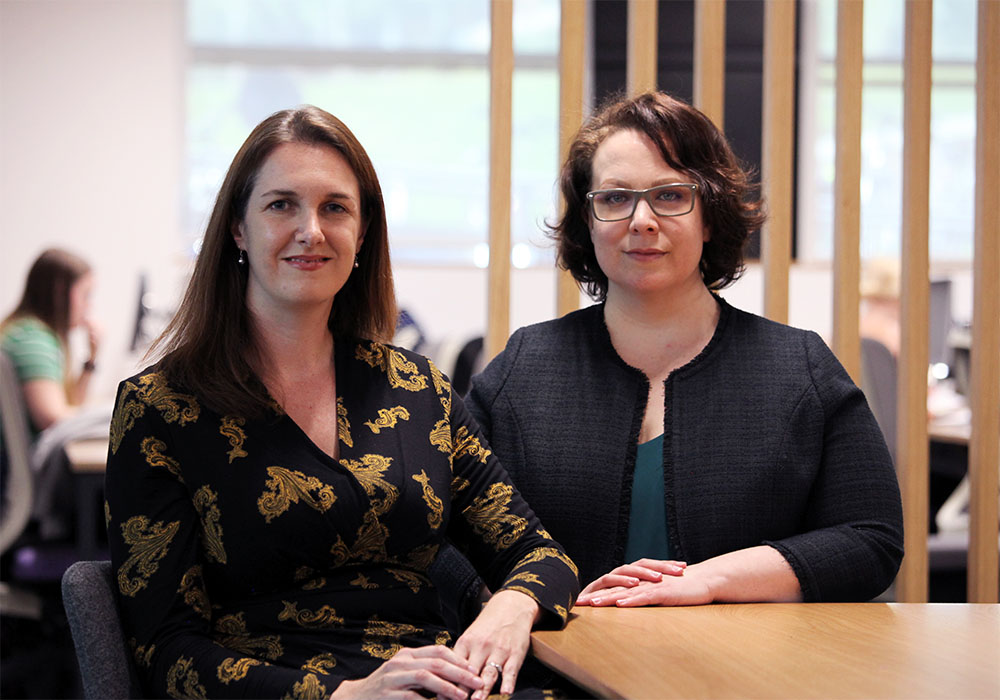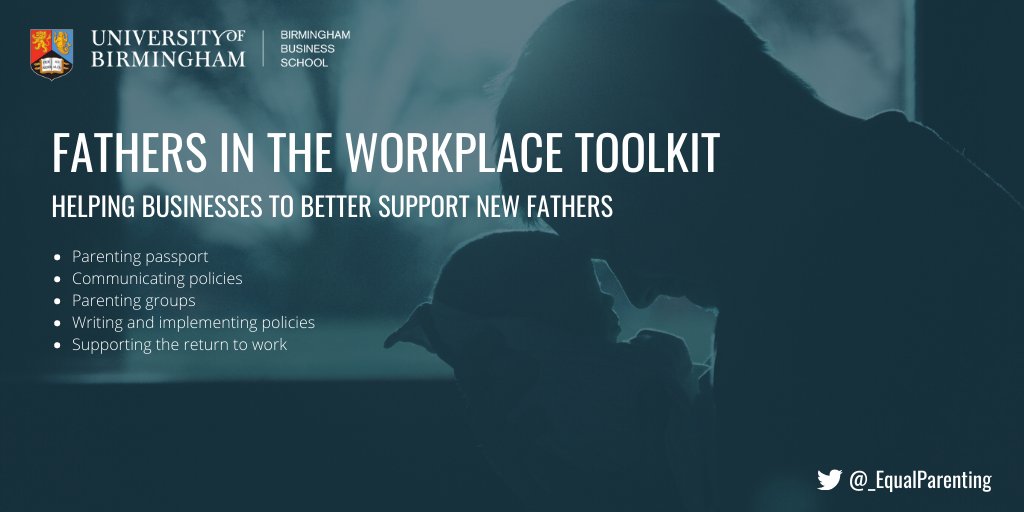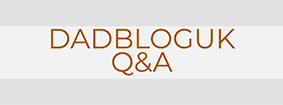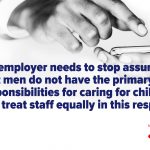Birmingham: The city that gave us Cat Deeley, Cadbury’s chocolate and, erm, heavy metal pioneers Black Sabbath. Thanks to the University of Birmingham’s Equal Parenting Project, this fine Midlands city has also given us the Fathers in the Workplace Toolkit, a free resrource that employers can use to make their organisation more dad-friendly.

I was present at the launch of the toolkit, which took place at Portcullis House on the Palace of Westminster estate in March. As you can imagine, it was a very odd time to visit Westminster as we all knew COVID-19 was a huge problem, but nobody quite appreciated just how far reaching the consequences of this pesky virus would be.
With lockdown happening soon afterwards, I felt the Fathers in the Workplace Toolkit was a little overlooked. I wanted to do more to raise the profile of this important piece of work and so I got in contact with Dr Sarah Forbes and Dr Holly Birkett who were heavily involved in producing it.
Dr Sarah Forbes is an academic researcher at the University of Birmingham Business School. Dr Forbes’ work focuses on encouraging voluntary change within organisations. She has too many titles to list, but has had her work recognised with awards from both by Harvard University and the Academy of Marketing. Dr Holly Birkett, meanwhile, is a lecturer and Impact Lead at the Business School. Dr Birkett’s specialism is careers and career transitions and she is currently conducting research into parental leave policies and fathers in the workplace. She is also a co-direct of the Work Inclusivity Research Centre.
Both Dr Forbes and Dr Birkett are co-directors of the Equal Parenting Project. I was keen to speak to them about the toolkit and also to see if COVID-19 had any noticeable impact on workplace trends at this stage.
I feel this interview is a must-read for any father struggling to get his employer to recognise his caring responsibilities. It’s also a vital read for any employers or individuals working in Human Resources.
In your own words, can you explain what the Fathers in the Workplace Toolkit
The Equal Parenting Project is pursuing many avenues of research and engagement with the aim of helping break down barriers experienced by fathers in the workplace who wish to take on more childcare responsibilities. To help organisations better support their employees and to ensure they are aware of the support fathers in the workplace need, the Equal Project has developed the ‘Fathers in the Workplace Toolkit’. This toolkit is an academically informed, practical guide for organisations to help them support fathers in their workplace. This toolkit will help improve timely access to relevant information for fathers and parents, give examples of fathers successfully caring to normalise fathers taking leave, provide a guide to developing a business case for larger organisations to enhance pay for those taking (Shared Parental Leave (SPL) and help organisations to manage leave in a way which does not disadvantage fathers’ careers.
By implementing tools from the Fathers in the Workplace Toolkit, organisations may see an increased awareness and accessibility of parental leave policies, more fathers feeling able to take longer leave after the birth or adoption of their child and/or more fathers feeling better able to get advice and support within their organisation. Ultimately, this toolkit aims to help create a culture change within organisations so that fathers feel supported and more able to have time with their children. This in turn is likely to improve the wellbeing of fathers in the organisation and help with retention.
What inspired you and your team to create the toolkit?
The Equal Parenting Project completes research aimed at advancing gender equality in the workplace and, in particular, through organisational and government policy. Their research highlighted that organisations are incredibly interested to learn from best practice and implement research informed initiatives and as a result, Sarah and Holly provided companies with tools to support fathers in their workplaces. By developing the Fathers in the Workplace Toolkit, the Equal Project could help organisations of all shapes and sizes to better support working fathers. Holly and Sarah also made efforts to ensure that some interventions were cost neutral in recognition of the fact that different organisations have different circumstances in terms of available funds.
Did you find there was a desire from employers for this support or did the drive to produce it largely come from fathers?
A bit of both really.
Research completed by the Equal Parenting Project found that Fathers experienced barriers in the workplace to being able to take on their childcare duties. For example, one father talked about how he would always have to leave his jacket on his desk if he had to go and take his child to the doctor so people in his workplace would think he was nearby his office. This shows a need for greater inclusion for fathers in the workplace.
Organisations of all sizes have a great interest in learning from best practice. This is another strength of the toolkit given that it was developed with input from organisation that engage in best practice.
Who, so far, has put the Toolkit into practice?
We don’t know who exactly is using it, but the great news we have had from Members of Parliament at the launch of the toolkit in Westminster was that they would wish to use the Fathers in the Workplace Toolkit. We have also heard through third sector contacts that the toolkit is being promoted by them and accessed by organisations who wish to improve in their support of fathers.
The toolkit was made available in two versions, one for small organisations and one for large. Which is proving the more popular?
They have both had great interest. Amongst the small organisation pages, unique users are evidently being drawn to using the parenting passport as this was the most popular download in that part of the toolkit. On the large organisation section of the toolkit, creating inclusive policies was of particular interest. A well written Paternity Leave, Unpaid Parental Leave or SPL policy demonstrates that organisations are serious about supporting leave for mothers and fathers. Further to this, employers must make sure that they clearly communicate their parental leave policies since the way they are written plays an important role in the uptake of the policies. Avoiding jargon and screeds of pages can be off-putting for a parent-to-be. The policy module recommends that policies cover: statutory entitlements (or amount of pay above statutory, if applicable), eligibility criteria and outline exactly what benefits are available and processes followed by the employee and employer. By doing this as well as clearly outlining the leave and pay options available and how to apply for them, more parents are likely to engage and use such policies.
On the SMEs section of the toolkit, the communication page was also of particular interest. The Equal Parenting Project has identified the need for better communication in the workplace to improve awareness, overcome misinformation and ensure more parents are using policies they are entitled to.
Research from the University of Birmingham has shown that effective communication is key to encouraging fathers to use parental leave and caring policies and this module outlines ways to improve communication within the organisation.
It was launched in early March, just before the COVID-19 lockdown. Has this worked in the Toolkit’s favour because flexible and remote working rapidly became the norm, or has this stalled the toolkit’s adoption do you think?
The COVID-19 lockdown presented many organisations with having to learn very quickly how to support many employees working from home. The toolkit offers support in terms of allowing organisations to distribute the likes of the parenting passport to understand what support their employees needed. The Equal Parenting Project conducted research during the COVID-19 lockdown and found that organisations have been making efforts to improve the support they make available for employees working from home. Communication of the available support is essential as we hope our toolkit will help organisations to provide effective support to their employees.
We continue to see an interest in the toolkit and what people love is knowing that the toolkit is informed by research and is completely free to users. However, due to the COVID-19 pandemic, it was noticeable that the numbers viewing and engaging with the toolkit declined but this is likely due to businesses focusing on other things. Needless to say, this is exactly the time when organisations should be focusing on inclusivity. With the cultural shift in flexible working happening due to the lockdown and so many parents working from home, organisations must make sure they don’t overlook the importance of supporting working parents.

Do you think the impact of COVID-19 will lead to a more flexible, agile workforce as employers who may have been reluctant to adopt flexible working have seen its benefits?
Prior to COVID-19 there was slow progress in making flexible working culturally accepted means of working, particularly amongst fathers, however this has changed dramatically since the COVID -19 lockdown when so many were forced to work from home. Many of those that worked from home during lockdown had not previously considered it and would likely never have done it, either because their employers didn’t support flexible working or due to attitudes and perceptions regarding things like impact on career, productivity etc. Recent research undertaken by the Equal Parenting Project with employees and managers during COVID -19 shows employees who now have extensive experience of homeworking and other flexible working practices are likely to request working from home in the future. In addition, many managers and organisations who were previously sceptical about homeworking have been persuaded that is it is something they should encourage in the future due to their experiences in lockdown.
The toolkit proposes employers have a fatherhood champion. Do we need more senior managers to publicly state they work flexibly and champion this method of working?
A fatherhood champion is really important for companies to use as they promote the use of the policies and it is useful to have at least one champion who is a senior manager to show that the senior team is supportive of flexible working/leave for fathers. It is also important that the champions are not all senior managers because the Equal Parenting Project has found that only having senior managers can actually communicate that these policies are only accessible for senior managers because they will not experience any potential negative repercussions. Having champions that are relatable to different employees is very important.
We believe that due to the lockdown and the attitude shift toward working from home, we will likely see more senior managers state that they work flexibly. However, our data from managers based on their experiences during lockdown shows that they believe senior positions are less likely to be made available as job shares, part time or working from home, however, the more junior positions would be. This highlights the ingrained expectations to be physically present in the workplace are still there but this may erode over time and with more managers taking as flexible working becomes normalised.
You found that parenting policies are not always passed on to men when they start a new job or are about to become a parent. Why do you think that is?
This is really about societal expectations of who the primary carer is. This is what we are battling with at the Equal Parenting Project. Many managers still make the assumption that it is mums and not dads that will be taking a period of time away from work after the birth or adoption of a child. Also, some fathers may not raise it with their line manager since they fear the repercussions of taking a period of time away from the workplace because they believe this will impact their career due to a view that they lack commitment. For some fathers to be, they may not know of the policies being available as these may not be communicated within the workplace effectively either. Research by the Equal Parenting Project has shown that when it comes to some policies they may be placed on an online portal where nobody sees or knows they are there. Having policies communicated in areas of high foot traffic is very important. Within the toolkit, communication resources and top tips are included for organisations to use.
This highlights a greater need to ensure that men/fathers are provided information on parental leave policies and flexible working policies in their induction. There is also an issue with the level of knowledge amongst managers (and sometimes HR) of what forms of leave or support are available to fathers. Knowledge of policies is generally poor.
What’s the reaction been to the idea of a ‘parenting passport’?
This is by far the most popular tool in the Fathers in the Workplace Toolkit as those visiting the toolkit can download it and use it very quickly. Employers have found it to be incredibly useful which is probably because it is a free to use pick up and go tool which encourages open dialogue and helps the organisation show they are supportive and inclusive of fathers.
To wrap things up, can you outline where people can download the toolkit or find out more about your work?
- To view the toolkit, go here.
- The Equal Parenting Project webpage is here.







